



Article by: Hari Yellina
A Sunshine Coast distillery is making rum with Australia’s only certified organic molasses, utilising local sugar cane, pineapples, and tropical fruit. The remains from the distillation process will also not be thrown away. The dunder, as it’s referred to, is fed to hungry cattle. Sunshine & Sons Distillery is located in Woombye, Queensland’s Sunshine Coast. Michael Conrad, a co-owner of the distillery, said the farms in the Sunshine Coast hinterland had long piqued his interest. By procuring products on the Sunshine Coast, Sunshine & Sons co-owner Matt Hobson hopes to create long-term ties with local farmers. “That Sunshine Coast agricultural legacy, there’s greatness in that agriculture,” he remarked.
“Many of the foods we use now aren’t because we went out and aggressively sought them from farmers. In many situations, the producers have come to us with fantastic suggestions that we have implemented. “That Sunshine Coast agricultural legacy, there’s greatness in that agriculture,” he remarked. His family has farmed on the Sunshine Coast for 84 years, so he was wary of the new distillers at first. “But they’ve been around for a while, and they’ve spent a fortune and made a lot of progress. I hope they succeed; it would be wonderful to see a little firm succeed in such a large market. “I think it’s fantastic that someone promotes the local region and promotes it all around Australia and the world.”
Mr. Conrad and Mr. Hobson have enormous ideas for the distillery, and they want to enter into the national and international fine-spirit market. The distilling duo admitted, though, that getting the firm off the ground hasn’t been simple. “If you sat down and thought deeply about what we’re doing, there are a lot of reasons why you might not want to do it,” Mr Hobson said. “We’re generating now at the volumes we estimate will be required to support the growth of our business in at least two years.”
Richer uncollected, or dunder, earmarked for hungry cattle will result from increased rum production. “When we get our molasses and ferment it to get the ethanol that we then extract to make rum, we still have all of the original molasses with high mineral content, a tiny amount of protein from the yeast that’s in it, and it’s got all this great life in it,” Mr Conrad explained. “If we discard that, we’re kind of out of luck.” “So, we ship it off to a dairy farm and a cattle stud, where it will be used to supplement feed for their cattle.” “If we improve our output, the amount of dunder accessible to farmers grows.”
Ray Devere’s dairy farm will profit from the distillery’s increased supply of dunder. “I’ll get a one-litre [milk] response for every four litres [of dunder] I feed a cow,” Mr Devere added. Another advantage is that it’s local, making it relatively easy to obtain. “I’d be delighted to take it off their hands.” I have faith in the boys; they’re producing good goods down there, and it doesn’t bother me, nor does it bother the cows.” Mr Devere is also a fan of the rum being created at the distillery.